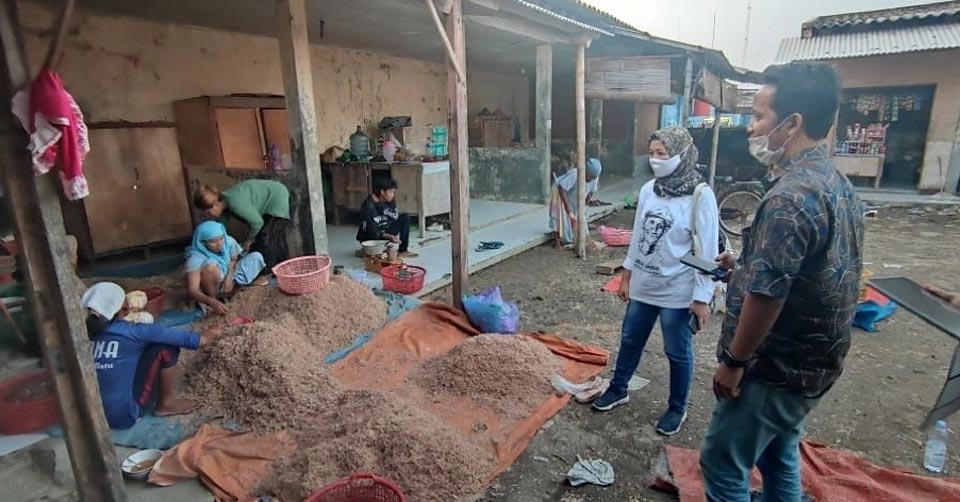How the fisherwomen of Java rise above climate change and an increase in gender-based violence
This case study explores these uneven impacts, the importance of collective active action, and the key role women play in sustainable recovery from Covid-19.

Disproportionate impacts on fisherwomen
Climate change is a global challenge that affects people from all walks of life. The impact, however, is even more pronounced for a group of fisherwomen in Demak, Indonesia struggling amidst the COVID-19 pandemic.
According to Masnuah, the head of the Indonesian Sisterhood of Fisherwomen, they experience social and economic vulnerability due to climate change in various ways, including the lack of protection against work-related accidents at sea, an increase in school drop-out rates among their children, greater financial debt, and an increase household responsibilities, among others.
Masnuah states that waves have become unpredictable, tidal floods are higher, and rising sea levels have already led to two residential villages in Demak being submerged. Tragically, even before the issues caused by climate change could be completely addressed, the residents of Demak faced another emergency, namely the COVID-19 pandemic, which has further exacerbated existing social inequalities.
Aside from the poor overall yield caused by climate change, the fish that are brought to the market are not yielding a high profit.
"The harvest in the last few years has indeed decreased greatly, and more so due to the pandemic, Gereh [a type of salt-cured fish] and small crabs are not selling well. Before COVID, fresh crabs that were caught were sold at a price of 80,000 to 100,000 [Indonesia Rupiah]. Ever since the pandemic, the price has dropped to 25,000 and no one has bought it. It’s all happening because the factory has closed, since then sales of crab have plummeted,” she said, during a webinar by the International NGO Forum on Indonesian Development, held under the theme of “Protection of Rights for Women Workers and a Sustainable Environment”.
Another responsibility that the fisherwomen of Demak have to take on is having to teach their children at home. "The space for women is getting more limited but the burden on them is increasing. During the pandemic, women have to care for and watch their children attend school online. That is, if those families can even afford cell phones and the necessary technology in the first place.” said Masnuah.
“They face various obstacles. The fisherwomen have to direct the teaching and learning process according to the methods given by school. Some of them don’t understand all the methods. Sometimes, these mothers experience a lot of stress because of it.” continued Masnuah.

Women also have to deal with domestic violence that has always been prevalent in Demak. However, conditions have worsened given the pandemic. In a report compiled by Komnas Perempuan (National Commission on Violence against Women), gender-based violence has increased by 63 percent. The commissioner for Komnas Perempuan, Alimatul Qibtiyah, has stated that since October 2020, the commission has received 1,617 reports, consisting of 1,458 cases of gender-based violence.
"During the pandemic, we do advocacy work against violence as usual; the hard part is that these victims and their companions do not have money for transportation. We finally collaborated with the LPSK (Institution for Witness and Victim Protection), so that transportation assistance was readily available.,” said Masnuah.
According to Masnuah, sometimes some of fisherwomen who report cases have to wait because the quota is limited. Those who want their cases to be resolved quickly would need to borrow money.
“They told me that they wanted to report or make a decision to register in court. We provide free legal court access, pro bono, through the Ministry of Law and Human Rights, specifically through the APIK Semarang (Legal Aid Institute). However the quota is limited. In this situation, the victim has to wait until the quota has been opened again. Some of them want to go into debt in order to solve the case.,” Masnuah.
In these difficult times, Masnuah admitted that she rarely has the chance to think about herself, which is also commonly expressed by other women fisherfolk. "Our time and energy are spent on our husbands, children and families," she said.
Despite this, the fisherwomen of Demak have taken it upon themselves to carry out various activities supporting one another, such as raising funds to buy UMKM product (Small Micro Medium Enterprises product) directly from farmers and fisher folk, providing masks and hand sanitisers to the fisherwomen prior to receiving government aid, educating the community regarding COVID-19 disease including its preventive measures as well as fundraising for the Desa Tenggelam (flooded villages).
"Because of human solidarity, we have an initiative to help coastal communities through donations. We help buy products from small enterprises because they are the ones who are the most affected.,” said Masnuah.
"There is also raising of funds for flooded villages that need to regain road access. Economic activity, education, and religious services are hampered because the road is sinking. It's all watery,” she added.
The experiences of the fisherwomen of Demak show that collective action is essential to drive change, especially during the uncertain times of a pandemic. These experiences further highlight that women have a key role to play when it comes to a sustainable recovery from Covid-19. There is no better time to harness their potential than at present because empowering women is the gateway to an inclusive, more climate resilient future for all.